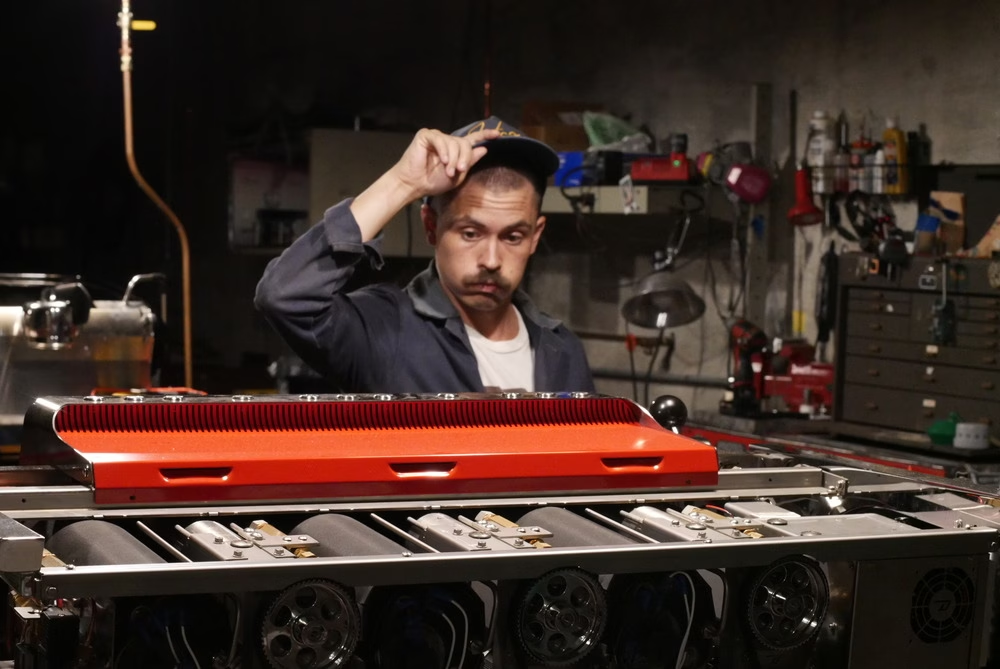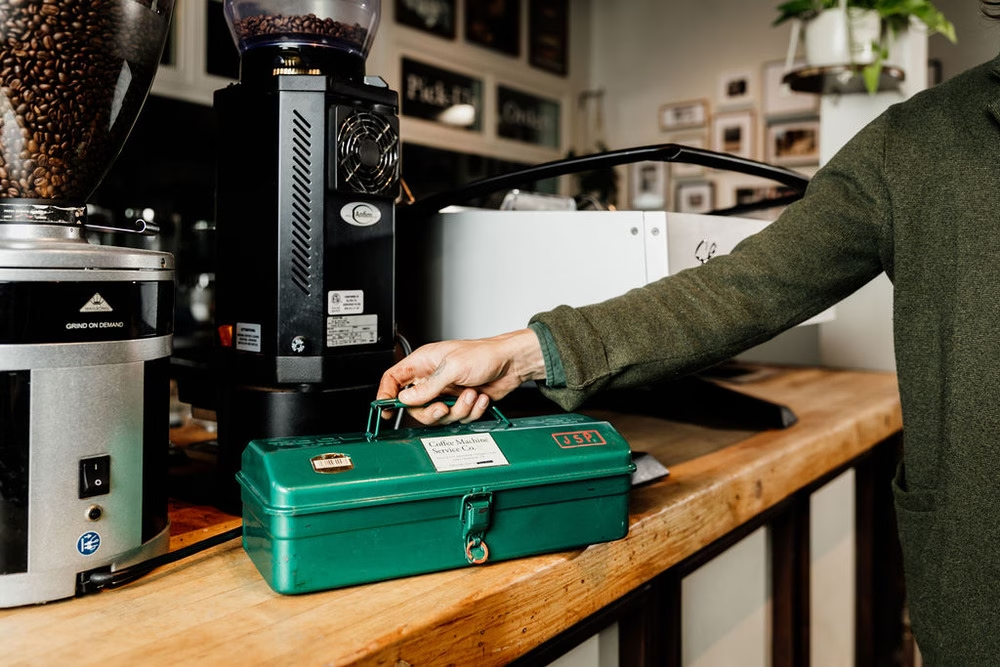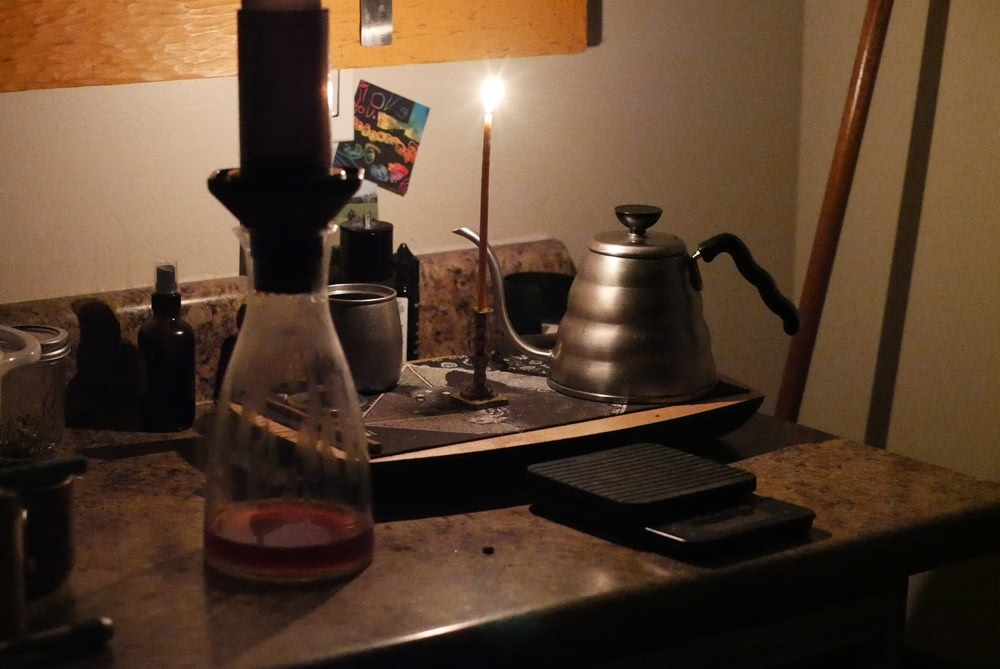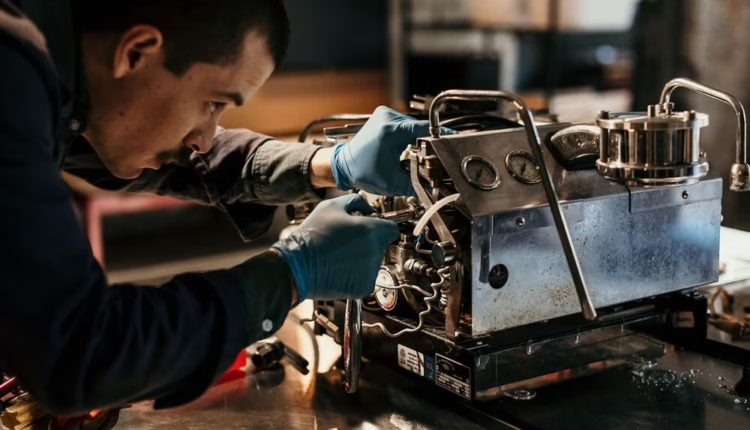Through the Lens of a Coffee Technician: 10 Minutes With Spencer Perez, Part One

From pulling espresso shots in an ice cream shop to founding Coffee Machine Service Co., Spencer Perez knows his way around coffee—and the machinery that makes it possible.
BY EMILY JOY MENESES
ONLINE EDITOR
Photos courtesy of Spencer Perez
In the world of specialty coffee, few roles are as essential—and as overlooked—as the service technician. Spencer Perez, founder of Coffee Machine Service Co., and Chattanooga, Tennessee’s go-to guy for all things coffee equipment, brings a poetic pragmatism to the craft of keeping machines (and people) running.
From his early days pulling shots at an ice cream shop to descaling boilers in his bathtub and helping launch the Service Layer Cooperative, Spencer’s journey blends hands-on grit with philosophical depth. In this two-part conversation, we dive into how a love for coffee, tools, and community shaped his path—and why the future of coffee might just depend on the folks behind the wrench.


Barista Magazine Online: First things first, can you tell us about how you got your start in coffee and as a coffee service technician?
Spencer Perez: My dad’s Cafe Bustelo coughing into the carafe, that’s probably where it started. Waking to a small storm and the smell of wet earth. He’d let me have half a cup now and again on Saturdays, when we worked on the cars or built bicycle ramps. By eighth grade, I was bringing a travel mug to school. That year, this great ice cream and coffee shop opened near our house, and when I turned fifteen, they hired me. That was my first experience with espresso. That was 2005.
Fast forward ten years through all kinds of work in several coffee companies—the latter three spent in the early days of PERC Coffee—and I was getting to know Andrew Gage, who started Velo Coffee Roasters. We’d talk a handful of times a year about our challenges selling light-roasted coffee in the Southeast. Eventually, he asked me to come on as a partner, and that’s what brought us to Chattanooga.


We did a lot of work at Velo that I’m proud of, not least of which was a group study with modbar. We shared our 3bar, 195F espresso recipe with them, and they pulled in other cafés who were experimenting with low pressure to start to work out some ideas about it all. Those machines opened new horizons for coffee, but they weren’t especially reliable. Or maybe they would have been, were there more good techs. I don’t know, ours broke constantly. My dumpy bikes did, too.
I’d taken up hobby motorcycling, and the skills I’d gained with a set of tools made me the de facto in-house tech at Velo. Days, I designed packaging and ran QC. Nights, I descaled steam boilers in the bathtub.
In 2017, we endured a string of disappointments. Our shoestring second café wasn’t doing well. Our cold brew expansion wasn’t either. Staff felt ignored. Tensions were high. We were spent.
Jacked into the computer in my windowless office, my concepts grew increasingly idiosyncratic. I obsessed over magical roast-phase meta-ratios as silver bullets for sweetness. Manic delusions of Fibonacci spirals and non-orientable surfaces filled my waking hours.
I was drinking a lot. I was over-caffeinated and underslept. It was hurting me and the company. I needed a change. I needed to work with my body again. To come back to earth. I bought a scythe to cut my grass. One early Saturday morning—it’s better with some dew on the ground—I realized Chattanooga needed a technician, and I knew it had to be me.
What does your day-to-day look like?
I’ve been in a stable-ish morning routine for the past couple years. Light exercise at sunrise, coffee on the porch, and breakfast with my daughter. My wife Sarah runs operations at Coffee Machine Service Co. (CMSCo), and I handle sales and tech support. If I don’t have something first thing, we usually get to the shop around the same time, between 8:30 and 9.
Summers are different, this is a family business. I make another coffee and we meet for 15-30 min to review the day’s work orders, clarify purchasing requests, whatever. Then it’s into the work. Sometimes, we’re busy in the field with maintenance, repairs, and installations. Sometimes, we’ve got machines on the workbenches. Sometimes, it’s systems development or cleaning the bathroom. Sometimes, it’s meetings all day. It’s usually some mix of all of the above. Most weeks, I spend a lot of enjoyable time talking with baristas and café owners. That’s good energy for the work. On cooler days, I’ll spend a little time in the hammock after lunch. That’s an important part of the job, too.
There’s no end to the work, so I get to decide when I’ve done enough. Time allowing, I might jump in a creek, work on a personal project, or just sit awhile and see what comes up. Then I go home to spend time with my family.



Apart from being a technician, you also work as a consultant, installer, and contractor—is it typical for service technicians to take on multiple roles in this way?
All the best techs I know function as consultants from time to time. To find the right equipment for a customer, we have to understand their priorities, strengths, and weaknesses. If they want it, we can leverage our network or experience with coffee to improve their operation. So CMSCo. are not “coffee consultants” per se, but we spend a lot of time doing those sorts of things.
Installation is included with the purchase of new commercial espresso machines, but not all techs install gear they didn’t sell. We do, with some conditions: namely, a financial arrangement with the customer or reseller that fairly compensates us for an expert bench test, installation, and user training, which equipment sales help us subsidize. Compromises to that process in the interest of cost savings rarely go well.
And yes, most founder-techs wear lots of hats. It reminds me a little of the early years of American third-wave. This is still a young trade, mostly propelled by people with more vision than money. People wary of the corrupting influence of debt. People deeply attuned to the relationships between body, work, and community. Long-gamers. We grow slowly.



What prompted you to help facilitate the launch of the Service Layer Cooperative? What issues have you experienced firsthand as a coffee service technician that you hope to address through the SLC?
Doing this well is rewarding in so many ways, but it took me a long time to find solid footing. If I can help bring a richer version of my experience with the Service Layer to more techs, I’d like to.
For CMSCo., it was hard early on to find guidance and resources for building an operational foundation. Manufacturer trainings are generally rudimentary, and you can’t go to all of them, so sometimes you work on unfamiliar platforms. Service Layer members have been instrumental in supporting our development. They’ve shared arcane knowledge, workshopped best practices, and mentored us. They’ve organized more advanced trainings with allied manufacturers and adjacent specialists.
Shaping consumer culture is hard, too. Frequently, we’ll get a call from someone who had a unit installed —who knows by whom, (or if) it’s a model we sell—a year or less into its ownership. It’s not set up right. Or they got a great deal on a “refurbished” unit. They don’t know how to use it. They don’t know how to backflush. No one ever talked to them about service. But they’ve got scale in the tanks, steam leaks, flow rate discrepancies, and they found us. Crickets from the reseller, especially when they try to submit our bill for warranty coverage.
It’s hard for a first-time café owner to know how to navigate the marketplace, and techs have a lot of work to do to increase visibility. I’m hoping SLC can help with education, consumer access to great local techs, and come up with fair arrangements with other vendors so everyone does well. The co-op’s members are committed to deeply satisfying equipment experiences for their customers, which includes the shopping part, but it’s hard to invest in that experience when we’re being undercut by agents with little regard for the same.
We will release part two of this article tomorrow.
Subscribe and More!
As always, you can read Barista Magazine in paper by subscribing or ordering an issue.
Read the October + November 2025 Issue for free with our digital edition.
For free access to more than five years’ worth of issues, visit our digital edition archives here.
Source: Barista Magazine



